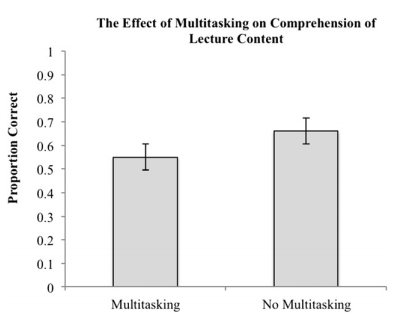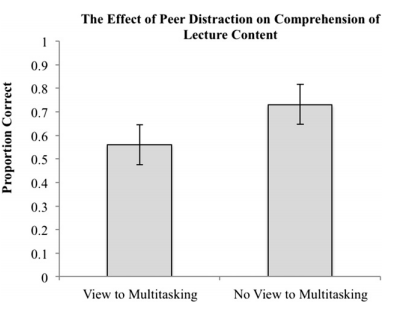One example is a recent study (Sana et al, 2013) on the effects of laptop multitasking on classroom learning. (Thanks to Twitter users @rboulle and @CyniqueDeGauche for tipping me off to this study.)
The authors had college-aged subjects come into a laboratory to listen to a 45 minute lecture on meteorology, meant to simulate the sort of experience they would have in a college classroom. Half of the subjects were given a list of secondary tasks to perform, meant to represent the sort of thing that a bored student in a lecture might investigate during part of the lecture that seemed slow. For example, one question was "What is on Channel 3 tonight at 10 p.m.?" All the questions were designed to be answerable with a simple search using websites that virtually students are familiar with (Google, YouTube, et al.)
The number of questions--twelve--seemed pretty high to me. The authors said that pilot testing indicated students could answer all twelve in about 15 minutes. Thus, students would be multitasking for one third of the 45 minute lecture. Researchers argued that other data indicate this percentage estimate is not unreasonable, although it makes me want to cry.
A forty item comprehension test administered 20 minutes after the lecture showed a cost to multitasking.
On the other hand, the potential for distraction is terrible. I've walked in the back of the classroom of many of my colleagues and seen that perhaps 50% of the students are on the Web.
Students think that they can snap attention back to class "when it gets interesting again." I don't have much confidence they can. Student judgments of their own learning are often not that well calibrated, and that seems to be especially true of multitasking. They think it's cost free.
Tellingly, researchers asked subjects in Experiment 2 to provide ratings as to whether they were distracted by other people multitasking and whether other people multitasking affected their own (the observers') learning. Average answers? "Somewhat distracting" and "Barely" hindered my learning.
What can be done?
Some educators simply ban laptops. Some banish laptop users to the back rows. I don't like either of these solution much because they impose a penalty on anyone who wants to use a laptop.
I asked our IT group if the Wifi could be turned on and off in my classroom. Nope.
Some argue that students are learning how to manage distraction, although there's not much evidence that students are learning this lesson. Certainly, I don't know of anyone actively teaching them this lesson.
Got ideas? I'd love to hear them.


 RSS Feed
RSS Feed